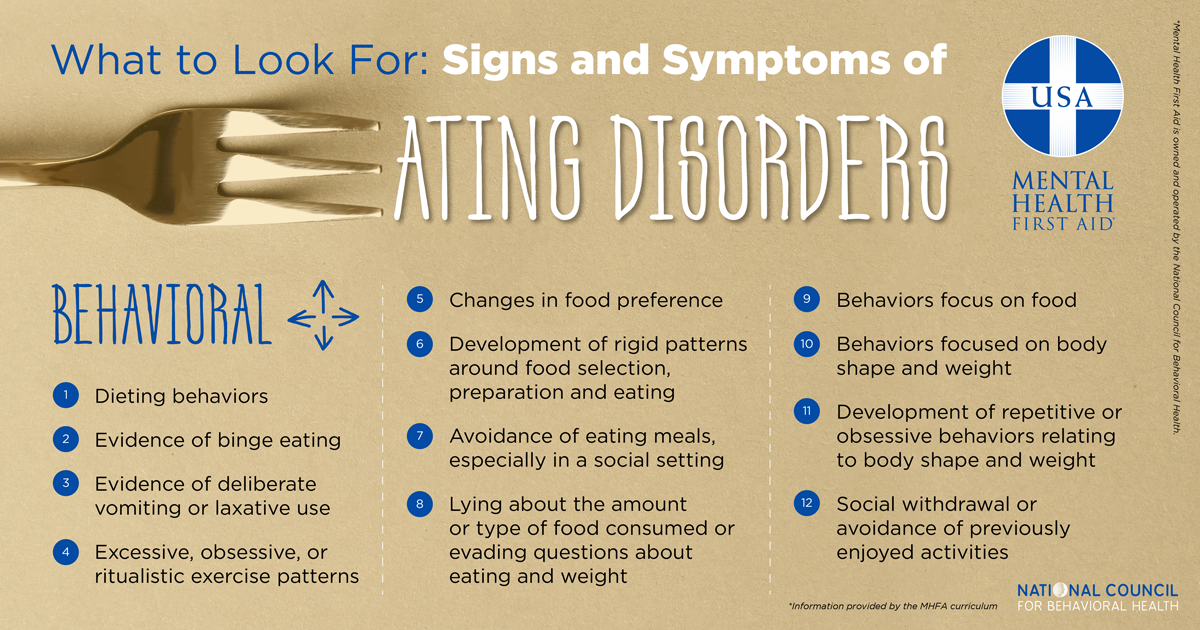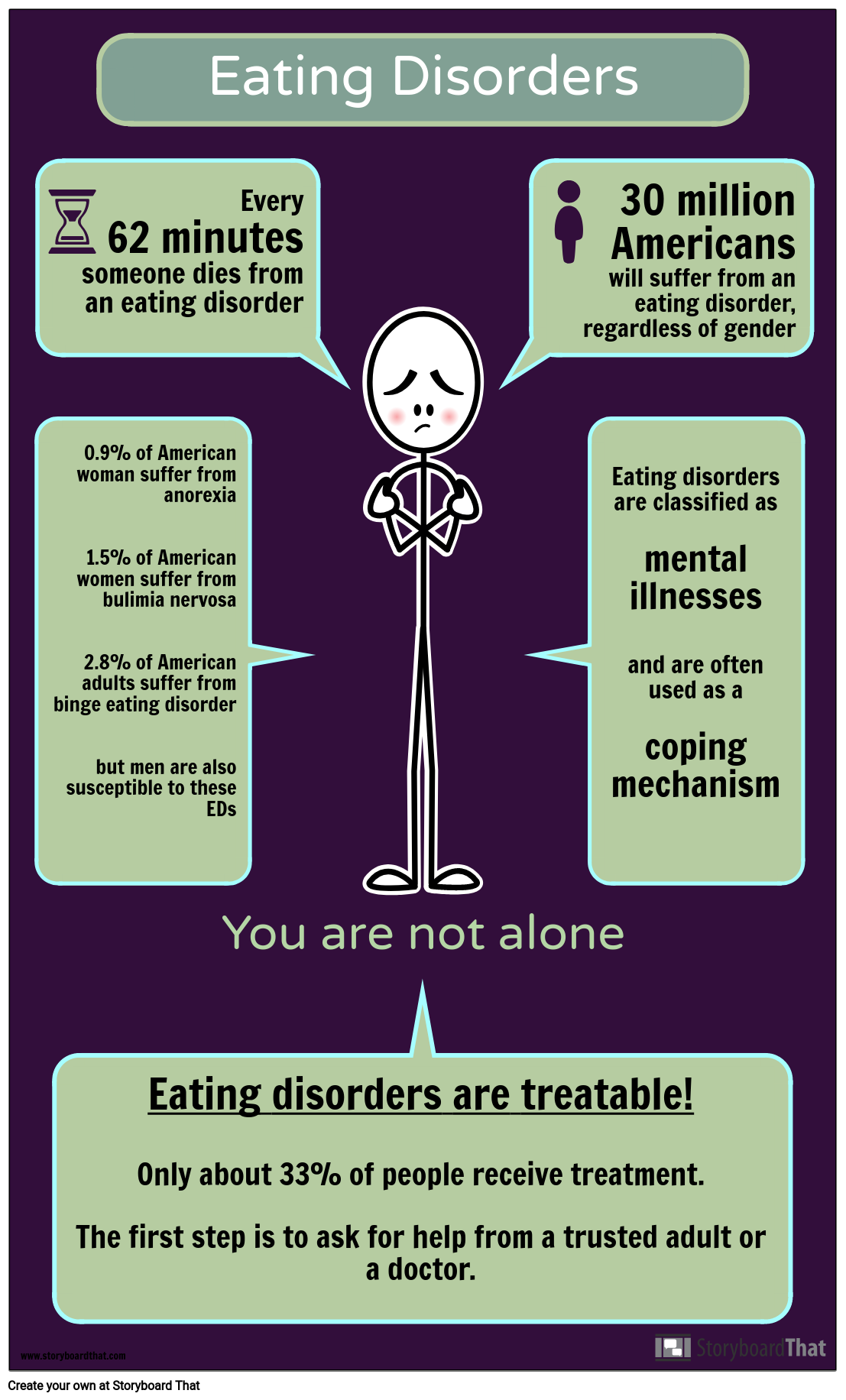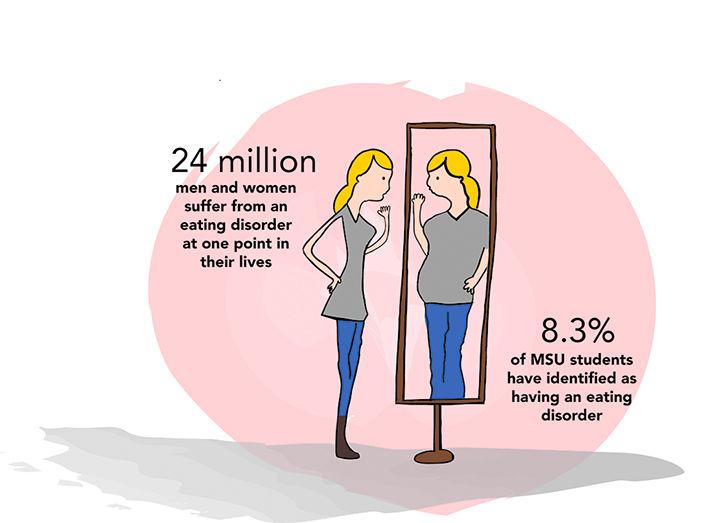Substance Abuse And Mental Health Services Administration
SAMHSA is a government agency that addresses mental health and substance use concerns throughout the country. Their website has a treatment locator that you can use to find a treatment facility in your area.
Additionally, the SAMHSA National Helpline is available 24 hours a day, 365 days per year. You can call this number to receive a referral for a treatment facility near you. All information is kept confidential.
Getting help for an eating disorder may initially seem challenging or scary. These feelings are normal discussing concerns about our bodies or our mental health can require us to be more vulnerable than were used to.
Remember: Seeking help is a big first step on your recovery journey.
If you think you may have an eating disorder, make an appointment with your doctor to discuss your concerns. You can choose to see your primary care doctor or a mental health professional.
Try to be as open as possible with your doctor about your thought patterns, eating habits, and concerns. Also, dont hesitate to ask questions if you have them.
If youre nervous, it may be helpful to bring a family member or friend along with you for support.
Disobey Your Eating Disorder
On a paper make a list with two columns. In one column, write, Ed says and in the other column, write, Recovery requires On each line under Ed says write what the eating disorder tells you to do.
On the corresponding line under the Recovery requires column write down how you will specifically disobey that command. For example,
- Ed says skip breakfast. Recovery requires me to eat breakfast.
- Ed says exercise today. Recovery requires me to take a day off.
This approach stems from Life Without Ed by Jenni Schaefer and Thom Rutledge and Narrative Therapy.
Common Types Of Eating Disorders
There are many different types of eating disorders, and some people may experience symptoms of more than one disorder. The most common eating disorders are:
- Anorexia nervosa: A condition in which people deliberately starve themselves or severely restrict food intake.
- Bulimia nervosa: A condition in which someone eats large quantities of food and then purges it, often through vomiting, taking laxatives, or exercising excessively.
- Binge-eating: A condition in which someone regularly overeats but does not purge.
Recommended Reading: Definition Of A Phobia
How To Help Someone With An Eating Disorder
If youre here, it’s because you want to better support someone in your life who has an eating disorderand that’s an amazing first step. Very likely, you are feeling worried about your loved one and you are confused about what you should and should not do.
You are probably feeling a little helpless and thinking what is there you can really do to help? Youre not alone as a lot of people have been in this position. With a little more information and guidance, please know that you can do a great deal to support your loved one.
Do I Have An Eating Disorder

The first step in your journey towards recovery is admitting to yourself that something is wrong.
It doesnt matter about age, gender, ethnicity or background anyone can develop an eating disorder. Thats because eating disorders such as anorexia, bulimia and binge eating disorder are complex mental illnesses and there is no one single cause for them.
The symptoms for eating disorders also present differently for each individual, which makes self-diagnosis or diagnosis without a professionals input extremely difficult and potentially dangerous. Its also worth noting that diagnoses and symptoms can change over time, so being guided on your recovery journey with the help of a psychologist or GP is advisable.
If you are looking for common signs and symptoms of eating disorders, please visit our pages on:
Below are some tools to help you decide whether you or a loved one need to seek professional help for an eating disorder.
Also Check: What Is The Fear Of Puke Called
What To Do If They Deny The Problem And Refuse Treatment
A commonand often frustrating for loved onessymptom of an eating disorder is anosognosia. People with eating disorders often lack insight into their illness, likely in response to malnutrition in the brain. As a result, they do not believe they need help.
Remembering there is a biological reason for this can help you to better handle this behavior. Dont think of them as being defiant or resistant. Instead, realize they have a deficit in their insight.
If you encounter this, continue to show you care but dont give in to their realitycontinue to tell the truth. By continuing to present reality and gently expressing concern, you may eventually be able to chip away at the lack of insight and encourage them to get help.
Understanding Your Loved Ones Eating Disorder
Eating disorders involve extreme disturbances in eating behaviorsfollowing rigid diets, bingeing on food in secret, throwing up after meals, obsessively counting calories. Its not easy to watch someone you care about damage their healthespecially when the solution appears, at least on the outside, to be simple. But eating disorders are more complicated than just unhealthy dietary habits. At their core, theyre attempts to deal with emotional issues and involve distorted, self-critical attitudes about weight, food, and body image. Its these negative thoughts and feelings that fuel the damaging behaviors.
People with eating disorders use food to deal with uncomfortable or painful emotions. Restricting food is used to feel in control. Overeating temporarily soothes sadness, anger, or loneliness. Purging is used to combat feelings of helplessness and self-loathing. Over time, people with an eating disorder lose the ability to see themselves objectively and obsessions over food and weight come to dominate everything else in their lives. Their road to recovery begins by identifying the underlying issues that drive their eating disorder and finding healthier ways to cope with emotional pain.
While you cant force a person with an eating disorder to change, you can offer your support and encourage treatment. And that can make a huge difference to your loved ones recovery.
Need to talk to someone?
Also Check: Aphobic Definition
Spotting The Signs Of Anorexia
Not sure if there’s a problem? These are some of the early signals that a friend may have an eating disorder:
-
Behaving differently when it comes to food, such as avoiding going out for meals or eating in front of you.
-
Being obsessive about food, including cutting out lots of different food groups or planning healthy meals meticulously.
-
Having a distorted view of their body size.
-
Losing a lot of weight.
-
Disappearing to the toilet after meals.
-
Being tired or irritable a lot of the time.
-
Exercising obsessively.
Once you think your friend may have an eating disorder, you need to know how to discuss it with them so you can offer support and encouragement to get help:
If you’re really concerned and they refuse to speak to a doctor, you can speak to their doctor about your concerns. Their doctor won’t be able to disclose anything to you about them without their consent. But they can take note of your concerns, and bear it in mind at their next consultation. Do be aware, though, that finding out you’ve gone behind their back could put a strain on your relationship – working together is always best if possible.
How to help a friend with an eating disorder
Help With Eating Disorders: How To Deal With Them
Eating disorders are a serious problem that affects millions of people worldwide. They are not something that can be cured overnight. But it is possible to feel better with the help of psychotherapy and other coping strategies. Psychotherapists specializing in eating disorders offer many different treatments for their patients. This blog post will discuss the different types of eating disorders, how they manifest themselves, and what you can do to help with eating disorders.
Contents
Read Also: Which Organization Sets The Standards For Diagnosing Eating Disorders
How To Help Your Child With An Eating Disorder
An eating disorder is a huge problem for anyone, but it is so much more devastating when your child develops one. It can be a prelude to tragedy, considering that every 62 minutes a person dies as a consequence of this condition. Therefore, it is essential that you provide your child with treatment and support as early as possible. Eating disorders can be managed if you pay attention to the problem and get proper treatment. Working together with your child, you will be able to help him or her through this experience and emerge stronger for it.
School Strategies For Assisting Students With Eating Disorders
Mandated student support programs
Many public school districts are mandated to provide student support in the form of either a Response to Intervention or Multi-Tiered System of Support program. These programs typically cover any area, whether academic, behavioral, or socio-emotional, in which a student might need support. The MTSS approach consists of three tiers increasing in intensity from Tier 1 to Tier 3 as follows:
Public school districts are mandated to provide this support. If they do not have staff to do it, they must find someone. Often a county intermediate unit will have a psychologist or behavioral specialist assist the district in developing interventions for the students.
Creating a school strategy
It takes a villageadministrators, teachers, guidance counselors, school nurses, coaches, and parentsto create an effective strategy and check periodically to assess how well its working and whether gaps exist. This checklist of to-dos is a useful start of things to consider.
Checklist: Developing a school-wide strategy
Develop a student assistance program and protocol, if one is not already in place , for students, faculty, and staff to channel nonacademic concerns about a student. This should create an appropriate pathway that adheres to the local laws and regulations governing communications among teachers/parents/students/outside healthcare.
Consider offering a community outreach program on eating disorders with invited experts.
How to help students
You May Like: Fear Of Spoons Phobia Name
Who Is At Risk For Eating Disorders
Eating disorders can develop at any age. They affect all genders, races and ethnicities. Its a myth that eating disorders mostly affect girls and women. Boys and men are equally at risk. Certain factors may make you more prone to developing an eating disorder, such as:
- Family history of eating disorders, addiction, or other mental health issues, such as depression.
- A history of trauma .
Other factors include:
- Diabetes .
- Involvement in activities that focus on a slender appearance, such as modeling, gymnastics, swimming, wrestling and running.
- Major life changes, such as starting a new school or job, a divorce or a move.
- Perfectionistic tendencies.
Be Aware Of The Example You Are Setting For Your Daughter

It is important as parents to be an example to children, especially with positive body image. Model healthy eating and exercise habits. Be aware of your attitudes and behaviors in regards to food and body image. Instead of talking about diets and losing weight, talk about being healthy and eating right. It is important not to make negative remarks about body image in regards to you or anybody else.
Recommended Reading: Pristique For Depression
Tips For Your Own Wellbeing
It’s important that you manage your own wellbeing while supporting your friend or family member. Try to do the following if you can:
- Remember that recovery can be a long process. While their body might look healthier quickly, they may be finding things hard emotionally. Relapses are common and don’t feel very encouraging. It helps to accept this as part of the process. Don’t blame them, yourself or anyone else.
- Try to be kind to yourself. Supporting someone with an eating disorder can be upsetting and exhausting. It’s important to remember that your mental health is important too, and you deserve support for yourself as well. For for information, see our pages on how to cope when supporting someone else and helping someone seek help.
- Seek support from specialist organisations. Depending on your relationship to the person, there may be dedicated support options. You might find it helpful to look into the Young Minds Parents Helpline and Beat’s Support for Carers.
Mental illness, my Dad and me
“It was a huge sacrifice on my Dads part as he gave up a lot of aspects of his life.”
Misunderstandings About Eating Disorders
When most people think of eating disorders, they think of someone who is overly thin. However, you can have an eating disorder and have a normal weight, or even be overweight. The most important thing that many people dont realize about eating disorders is that they are a serious mental health issue and can be very dangerous. They can affect and damage many parts of the body and can even be lethal. Of all the kinds of eating disorders, anorexia nervosa is the one that is most likely to lead to death.
Also Check: Feritriphobia
When To Talk About Eating Disorders
Eating disorders are a growing issue in the U.S., where 30 million people have an eating disorder. Meanwhile, 95% of those people with eating disorders are between the ages of 12 and 25.
Those with eating disorders also have the highest risk of death of any mental illness. For this reason, it is important to talk to your child about eating disorders if you suspect an issue.
“If a parent is concerned about a behavior they are observing in their child, I think they should definitely address it with them,” says Lauren Muhlheim, PsyD, a psychologist and certified disordered eating specialist with Eating Disorder Therapy LA. “The risk of asking about it is lower than the risk of not asking. They can let their child know that they are observing some behaviors and let them know they are worriedthey can do so without suggesting other behaviors.”
How To Help Someone With An Eating Problem
You can do lots of things to help, despite how helpless you might sometimes feel.
You may experience difficult feelings if someone you care about has an eating problem. You might:
- feel very worried about the person
- find it hard to know how to talk to them about it
- find it difficult to know how to deal with changes in their mood
- have tried to offer support, but found that they’re unwilling or unable to accept help.
This can make you feel powerless, frustrated and angry.
Read Also: Which Is Worse Bipolar Or Bpd
Signs And Symptoms Of Eating Disorders
Living with an eating disorder can be challenging, especially since food is such a central part of our lives.
It can sometimes be hard to tell the difference between an eating disorder and typical weight concerns or dietingespecially in a culture where dieting is common. It can also be hard to notice an eating disorder, because people who binge, purge, or starve themselves often hide their behavior. If you suspect someone you know is struggling with an eating disorder, check for these warning signs:
How To Help A Friend With An Eating Disorder
Trying to talk to someone you suspect has an eating disorder can be a daunting prospect. But this tricky conversation can be an essential first step to getting them the specialist support they need. Once they have confided in you, there’s a lot you can do to support them too.
Here are some ways you can help.
Read Also: Feretrephobia
How Do Eating Disorders Affect Health And Emotions
Eating disorders can cause serious problems throughout the body.
Anorexia can lead to health problems caused by undernutrition and low body weight, such as:
- low blood pressure
- feeling tired, weak, dizzy, or faint
- constipation and bloating
- autism spectrum disorder or attention deficit disorder
- problems at home and school because of eating behavior
How Are Eating Disorders Managed Or Treated

Treatments for eating disorders vary depending on the type and your specific needs. Even if you dont have a diagnosed eating disorder, an expert can help you address and manage food-related issues. Treatments include:
- Psychotherapy: A mental health professional can determine the best psychotherapy for your situation. Many people with eating disorders improve with cognitive behavioral therapy . This form of therapy helps you understand and change distorted thinking patterns that drive behaviors and emotions.
- Maudsley approach: This form of family therapy helps parents of teenagers with anorexia. Parents actively guide a childs eating while they learn healthier habits.
- Medications: Some people with eating disorders have other conditions, like anxiety or depression. Taking antidepressants or other medications can improve these conditions. As a result, your thoughts about yourself and food improve.
- Nutrition counseling: A registered dietitian with training in eating disorders can help improve eating habits and develop nutritious meal plans. This specialist can also offer tips for grocery shopping, meal planning and preparation.
The best treatment approach is often a combination of all of these professionals working together to obtain a comprehensive treatment to address the physical, mental and behavioral aspects.
You May Like: Anya Shumilina
Dont Focus On The Eating Disorder
Trying to make your daughter eat may seem like a great idea and feel supportive. However, you may find yourself and your daughter in a power struggle. It is important for you to express your love and concern for her and not get drawn into an argument. Instead, focus on your daughters emotions. Remember, eating disorders are about pain, self-conflict and difficult emotions. It is important to remain objective. Create an emotionally safe environment for your daughter to share her feelings with you.